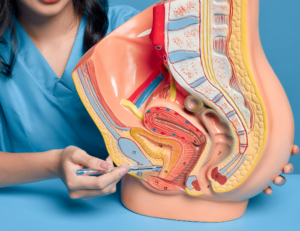Distinguishing Braxton Hicks from Labor Contractions
Key Labor Signs to Watch For:
- Mucus Plug Release: Losing your mucus plug indicates your cervix is dilating, signaling labor is approaching.
- Water Breaking: When the amniotic sac ruptures, it releases the amniotic fluid that cushions the baby during pregnancy. This sensation can vary between a sudden gush or a persistent trickle.
- Increased Vaginal Discharge: A bloody show may occur a few days before labor or during its early stages.
- Cervical Dilation: As the body readies for labor, the cervix softens, thins, and opens up to accommodate the baby’s passage.
- Baby’s Head Descending: When the baby’s head drops into the pelvis, labor is nearing. This may cause increased pressure or pain in the pelvic area.
- Cramping or Diarrhea: Loose stools or diarrhea can signify labor is imminent due to prostaglandin hormones.
- Back Pain: Persistent lower back pain that comes and goes, often radiating to the front of the abdomen, can be an indicator of labor. This pain can intensify during contractions and may be more noticeable than abdominal discomfort.
- Intensifying Contractions: When contractions become stronger, longer, and closer together, it is a sign that labor is progressing. If you notice a regular pattern and increased intensity, it may be time to contact your healthcare provider.
Keep in mind that every woman’s experience of labor is unique. You may not experience all of these signs, or they may manifest differently for you. Trust your instincts and stay in close communication with your healthcare provider throughout your pregnancy. If you have concerns or feel that you may be in labor, don’t hesitate to reach out to your healthcare team for guidance and support.
When to Head to the Hospital: Timing Your Arrival
Knowing when to go to the hospital or birthing center is crucial for expectant mothers to ensure a safe and smooth labor experience. While every woman’s labor journey is unique, here are some general guidelines to help you determine when it’s time to make your way to the hospital:
Regular Contractions:
Water Breaking:
Intense Pain or Pressure:
If you experience severe pain or pressure in your lower back or pelvis, or if you feel the urge to push, contact your healthcare provider right away. These could be signs that labor is progressing rapidly.
Decreased Fetal Movement:
If you notice a significant decrease in your baby’s movements, reach out to your healthcare provider for guidance. They may advise you to come in for an evaluation to ensure your baby’s well-being.
Vaginal Bleeding:
If you experience heavy bleeding (similar to a heavy menstrual flow) or bright red blood, contact your healthcare provider immediately, as this could be a sign of complications.
Concerning Symptoms:
If you develop a fever, severe headache, sudden swelling in your face or hands, or experience vision changes, contact your healthcare provider. These symptoms could indicate a potential issue that needs to be addressed promptly.
Remember that every labor experience is unique, and the above guidelines are not exhaustive. Trust your instincts and maintain open communication with your healthcare provider throughout your pregnancy. When in doubt, don’t hesitate to reach out to your healthcare team for guidance, reassurance, and support.
Choose WomanCare for Personalized Prenatal Care
For comprehensive prenatal care tailored to your unique pregnancy journey, trust WomanCare. Our dedicated practitioners offer exceptional medical care, education, and support throughout your pregnancy, birth, and postpartum period.
With convenient Chicago suburb locations, we’re always available to support you. Experience the difference that personalized and holistic healthcare makes by choosing WomanCare. Call us today at (847)221-4900 to schedule your first appointment.








